Some types of tea may help alleviate stress as well as reduce menstrual cramps, nausea, and bloating.
Women may be familiar with menstrual cramps – a sharp, persistent pain in the lower abdomen signaling the start of their menstrual cycle.
According to Eat This Not That, menstrual cramps are very common. However, you have many options to ease this pain through measures such as:
- Over-the-counter pain relievers (OTC) like ibuprofen and acetaminophen.
- Home remedies such as soaking in a hot bath, applying a heating pad to your lower back or abdomen.
Not every remedy works effectively for everyone. Another remedy to add to women’s lists each month is drinking tea.
Research exploring the benefits of tea for menstrual pain is still quite limited, but some evidence suggests that various types of tea can help reduce menstrual cramps and other unpleasant side effects associated with menstruation, such as nausea and bloating.
Ginger Tea
Nutrition expert Eva De Angelis, who also writes about health and nutrition for Healthcanal, states that many people use ginger to help alleviate digestive issues such as nausea and bloating.
Due to its anti-inflammatory and pain-relieving properties, ginger may also help reduce menstrual cramps and bloating.
Although there are no specific studies examining the effects of ginger tea on menstrual cramps, small studies on various forms of ginger suggest that this herb can alleviate menstrual pain:
A review of research indicated that participants who took 750-2,000 milligrams of ginger powder during the first 3-4 days of their period reported less pain compared to those taking a placebo.
A small study involving college students found that consuming 200 mg of ginger every 6 hours effectively reduced menstrual pain, comparable to the medication Novafen.
Expert Parmeet Kaur notes that excessive consumption of ginger tea can cause some mild side effects such as stomach discomfort, heartburn, and diarrhea. You are more likely to experience ginger tea side effects if you exceed 4 grams of ginger per day.
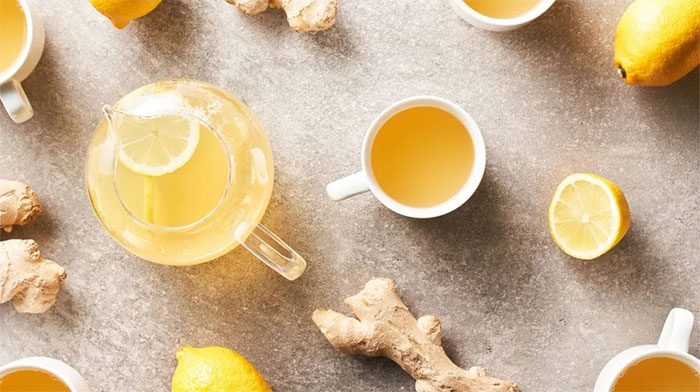
Drinking ginger tea helps reduce menstrual pain and bloating for women during their menstrual period. (Photo: Healthline).
Green Tea
Green tea contains a chemical compound called L-theanine that may help you feel relaxed and alleviate cramps caused by menstruation.
In fact, one study showed that women of reproductive age who consumed green tea experienced lower levels of menstrual pain compared to those who did not drink tea.
However, keep in mind that green tea contains caffeine, and this amount can be enough to disrupt your sleep. It’s best to drink green tea in the morning.
Caffeine can also impact menstrual cramps. Expert Parmeet Kaur explains that caffeine causes the uterus to contract more strongly, which can increase pain and discomfort for some individuals.
<pAccording to Parmeet Kaur, some people report that caffeine helps relieve their cramps, while others say it exacerbates them. Therefore, if you want to try green tea for menstrual cramps, it’s advisable to start with a small amount and observe your body's response. Additionally, you may opt for decaffeinated green tea.
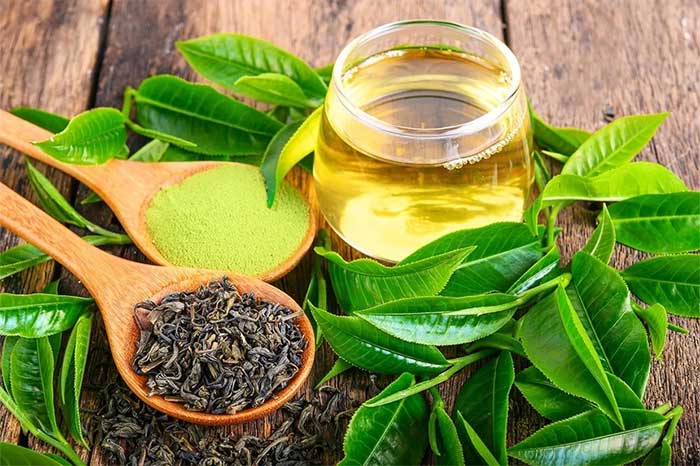
Green tea contains polyphenols. These compounds are rich in antioxidants with anti-inflammatory properties, offering additional health benefits such as preventing cancer and diabetes. (Photo: Longevity Technology).
Chamomile Tea
If you have ever tried sipping a warm cup of chamomile tea before bed to fall asleep faster, you may be familiar with its calming effects. Chamomile contains a chemical compound called apigenin that promotes feelings of sleepiness and relaxation.
One study found that chamomile tea also helps address several aspects of premenstrual syndrome (PMS), including cramps. Furthermore, since chamomile tea may promote sleep and reduce stress, it is a good choice when you feel fatigued due to menstruation.
Nutrition expert Eva De Angelis mentions that chamomile also reduces menstrual bleeding, which helps alleviate cramps.
In a small 2020 study, participants who consumed 250 mg of chamomile three times a day during the week before their period experienced less menstrual bleeding than those taking a placebo.
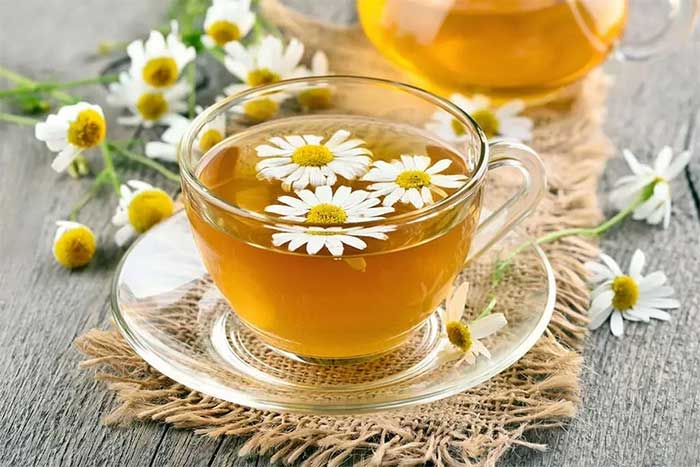
A small 2020 study indicated that poor sleep quality could make menstruation more painful for women. (Photo: AdobeStock).
Oolong Tea
Oolong tea is a traditional Chinese tea made from the same plant as green and black tea. With oolong tea, the leaves are processed differently, yielding a fruity or floral flavor.
Research indicates that oolong tea also has similar benefits to green tea in helping to reduce cramps. Additionally, oolong tea may aid in pain relief.
Moreover, oolong tea contains caffeine, although the amount can vary depending on the type and brewing strength. Generally, the caffeine content in oolong tea falls between that of green and black teas, averaging about 37-55 mg per 236 ml cup.
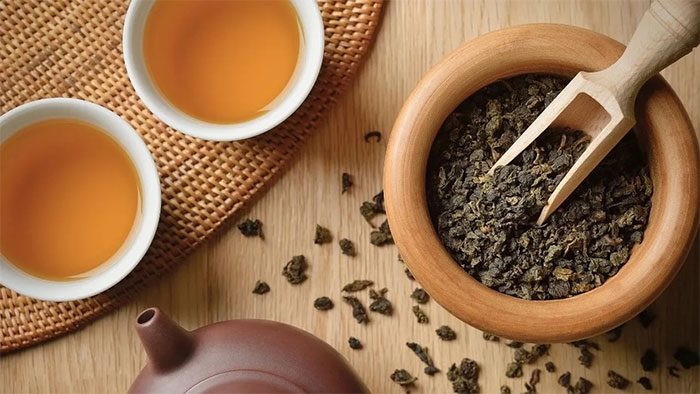
Oolong tea offers similar benefits to green tea. (Photo: First For Women).
Cinnamon Tea
Some evidence suggests that cinnamon may help reduce inflammation and bloating right before and during menstruation.
Cinnamon also helps alleviate pain and nausea during menstruation. In one study, participants who took 420 mg of cinnamon three times a day reported less menstrual pain, bleeding, and nausea compared to those taking a placebo.
This study used cinnamon powder supplements rather than cinnamon tea. Thus far, no specific research has investigated cinnamon tea. However, anecdotal evidence suggests that some people find drinking cinnamon tea helps relieve pain along with a pleasant warming sensation.
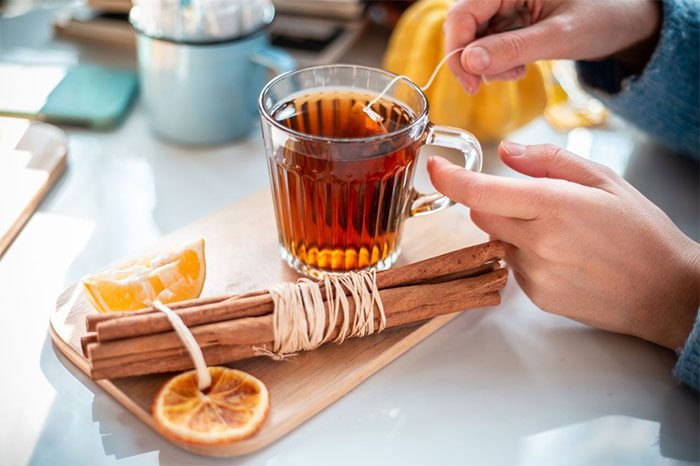
Cinnamon also provides additional health benefits such as improving blood circulation, lowering blood sugar levels, and reducing high cholesterol. (Photo: Verywell Fit).
Fennel Tea
Fennel is an herb with a mild licorice flavor. Nutrition expert Eva De Angelis states that fennel and its seeds are rich in vitamin C and quercetin, two antioxidants that can reduce inflammation.
Experts continue to research how fennel tea may impact menstrual cramps over time, but the evidence seems promising:
In a small study, participants who drank 30 mg of fennel extract four times daily during the first three days of their period reported significant relief from menstrual pain compared to those taking a placebo.
A 2020 review indicated that fennel appears to have pain-relieving effects similar to pain medications and is likely more effective in reducing menstrual pain than a placebo.
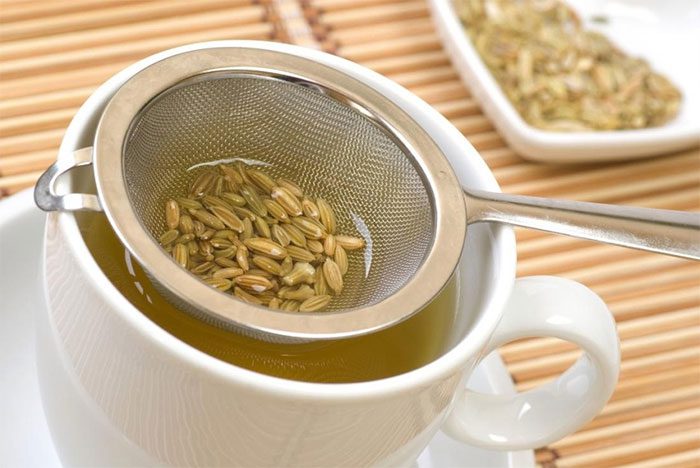
Women should consult a doctor before consuming any herbal tea while breastfeeding or if there is a possibility of pregnancy. (Photo: Medical News Today).
Experts continue to investigate the potential benefits of various teas for menstrual pain. However, the good news is that drinking tea is unlikely to harm your health.
So, even if tea acts like a placebo or does not fully alleviate your menstrual cramps, you can still safely enjoy sipping on them.
While research on teas and their effects on menstrual cramps is still quite limited, certain teas like ginger and chamomile may help alleviate cramps. Additionally, a warm cup of tea can provide a soothing and relaxing sensation, especially if you feel stressed or anxious before your period.
Drinking tea may not completely eliminate menstrual pain. However, 1-2 cups daily can help ease cramps and potentially make subsequent menstrual cycles less painful.


















































